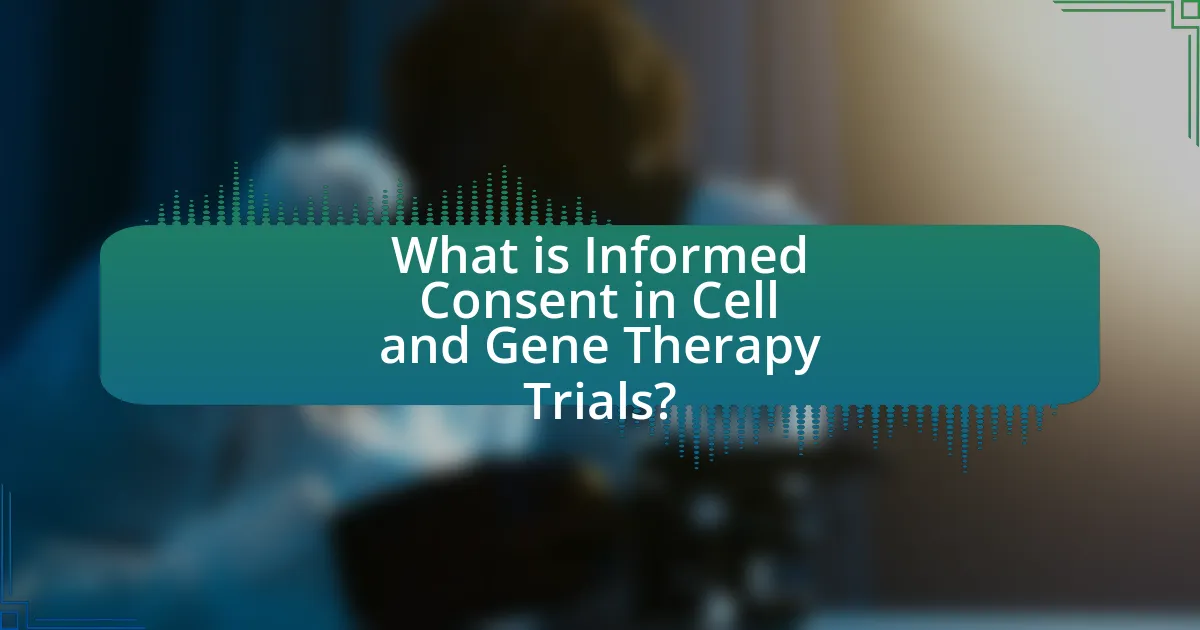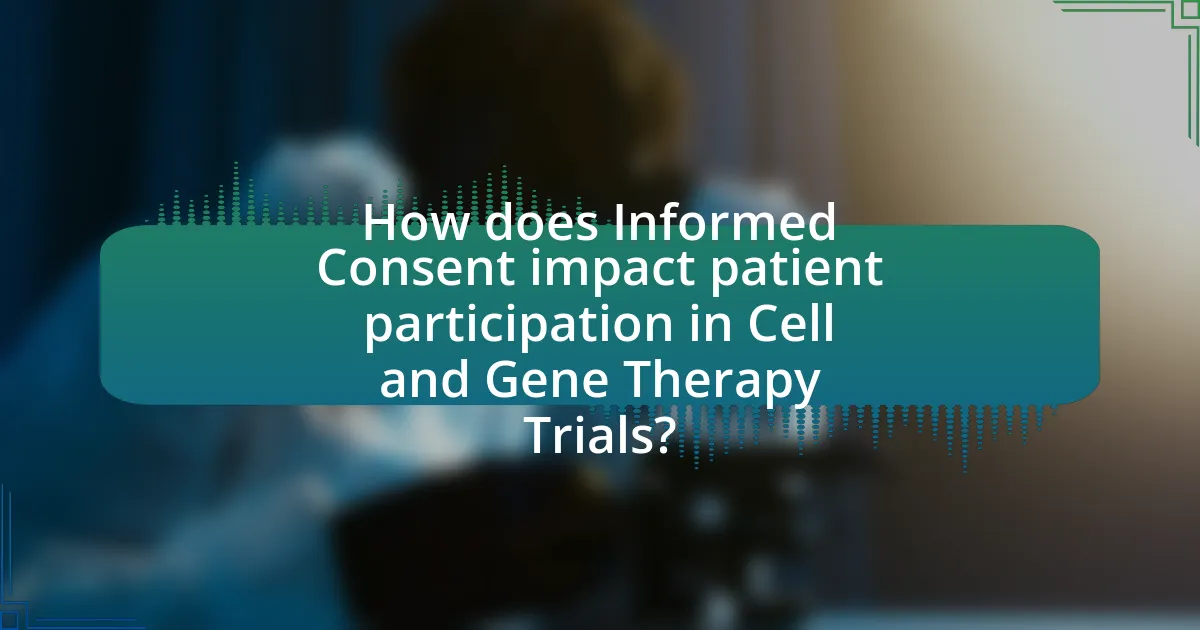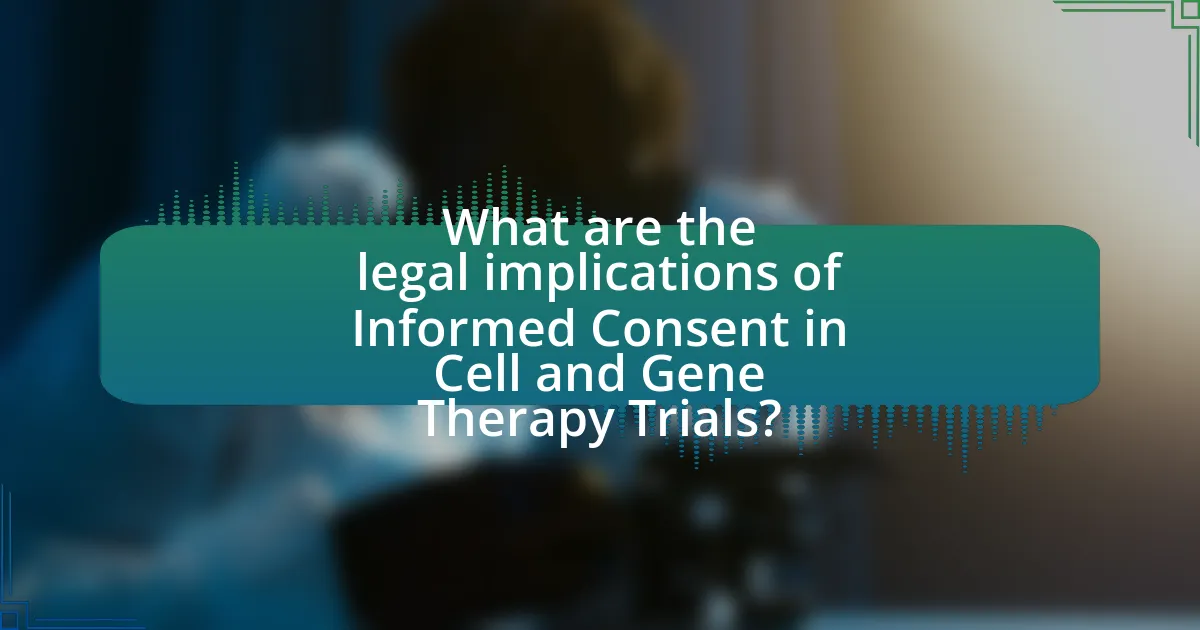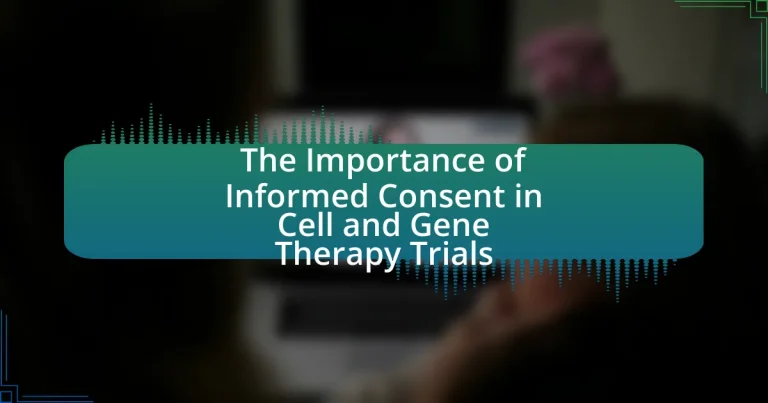Informed consent is a critical process in cell and gene therapy trials, ensuring that participants are fully informed about the trial’s purpose, procedures, risks, and potential benefits. This article outlines the ethical principles underpinning informed consent, including autonomy, beneficence, non-maleficence, and justice, and discusses its importance in protecting patient rights and promoting ethical research practices. Key components of informed consent, challenges in obtaining it, and the impact of clarity and trust on patient participation are examined. Additionally, the article addresses the legal implications of informed consent, regulatory frameworks governing it, and best practices for enhancing understanding and transparency in the consent process.

What is Informed Consent in Cell and Gene Therapy Trials?
Informed consent in cell and gene therapy trials is the process by which participants are provided with comprehensive information about the trial, including its purpose, procedures, risks, and potential benefits, allowing them to make an educated decision about their participation. This process is crucial as it ensures that participants understand the experimental nature of the therapies, which may involve novel and untested approaches, and the associated uncertainties. Regulatory bodies, such as the FDA, mandate that informed consent documents be clear and thorough, reflecting the ethical obligation to respect participants’ autonomy and protect their rights throughout the research process.
Why is Informed Consent Crucial in Clinical Trials?
Informed consent is crucial in clinical trials because it ensures that participants are fully aware of the risks, benefits, and procedures involved before agreeing to participate. This process respects the autonomy of individuals, allowing them to make informed decisions about their health and participation in research. According to the Declaration of Helsinki, informed consent is a fundamental ethical requirement in medical research, emphasizing the necessity of voluntary participation based on adequate information. Furthermore, studies have shown that clear communication during the informed consent process can enhance participant understanding and retention of information, ultimately leading to more ethical and responsible research practices.
What ethical principles underpin Informed Consent?
The ethical principles that underpin Informed Consent are autonomy, beneficence, non-maleficence, and justice. Autonomy emphasizes the individual’s right to make informed decisions about their own body and treatment options. Beneficence requires that actions taken in medical contexts promote the well-being of patients, while non-maleficence mandates that harm should not be inflicted on patients. Justice ensures fair distribution of healthcare resources and equitable treatment among participants. These principles are foundational in ensuring that individuals are fully informed and able to consent to participation in clinical trials, particularly in complex fields like cell and gene therapy.
How does Informed Consent protect patient rights?
Informed consent protects patient rights by ensuring that individuals are fully aware of the risks, benefits, and alternatives associated with medical treatments or research participation. This process empowers patients to make informed decisions regarding their healthcare, thereby safeguarding their autonomy and promoting ethical standards in medical practice. For instance, in cell and gene therapy trials, informed consent requires clear communication about potential side effects and the experimental nature of the treatment, which is crucial for patient understanding and voluntary participation. This legal and ethical obligation is supported by regulations such as the Common Rule, which mandates that researchers obtain informed consent to protect participants’ rights and welfare.
What are the key components of Informed Consent?
The key components of informed consent include the provision of clear information, comprehension by the participant, voluntary agreement, and the capacity to withdraw consent. Clear information entails detailing the nature of the procedure, potential risks, benefits, and alternatives, ensuring that participants understand what they are agreeing to. Comprehension requires that participants grasp the information provided, which may involve assessing their understanding through questions. Voluntary agreement emphasizes that consent must be given freely, without coercion or undue influence. Lastly, the capacity to withdraw consent at any time reinforces the participant’s autonomy throughout the trial process. These components are essential to uphold ethical standards in clinical research, particularly in complex areas like cell and gene therapy trials, where understanding the implications of participation is crucial.
What information must be disclosed to participants?
Participants must be informed about the purpose of the study, the procedures involved, potential risks and benefits, and their rights, including the right to withdraw at any time. This information is crucial for ensuring that participants can make an informed decision regarding their involvement in cell and gene therapy trials. For instance, the U.S. Department of Health and Human Services mandates that informed consent documents must clearly outline these elements to protect participants and uphold ethical standards in research.
How is comprehension of the consent information ensured?
Comprehension of the consent information is ensured through clear communication and educational resources tailored to the participants’ understanding. Researchers provide consent forms that use plain language, avoiding technical jargon, and often include visual aids to enhance understanding. Additionally, informed consent discussions are conducted in a question-and-answer format, allowing participants to seek clarification on any uncertainties. Studies have shown that using these methods significantly improves participants’ understanding of the consent process, as evidenced by increased retention of key information and higher satisfaction rates in clinical trial participants.
What challenges exist in obtaining Informed Consent?
Obtaining informed consent presents several challenges, primarily related to the complexity of information and the vulnerability of participants. Participants often struggle to understand intricate medical terminology and the potential risks associated with cell and gene therapies, which can lead to misconceptions about the procedures. Additionally, individuals with limited health literacy may find it difficult to grasp the implications of their participation, resulting in inadequate comprehension of the consent process. Research indicates that approximately 40% of patients in clinical trials do not fully understand the information provided to them, highlighting the need for clearer communication strategies. Furthermore, ethical considerations arise when dealing with vulnerable populations, such as children or individuals with cognitive impairments, complicating the consent process. These factors collectively hinder the ability to obtain truly informed consent in clinical settings.
How do language barriers affect Informed Consent?
Language barriers significantly hinder the process of obtaining informed consent by preventing clear communication between healthcare providers and patients. When patients do not fully understand the information presented regarding treatment options, risks, and benefits, they cannot make truly informed decisions about their participation in cell and gene therapy trials. Research indicates that misunderstandings due to language differences can lead to decreased patient comprehension, which ultimately affects their ability to consent meaningfully. For instance, a study published in the Journal of Medical Ethics found that patients with limited English proficiency were less likely to understand consent forms, leading to ethical concerns about their participation in clinical trials.
What role does patient vulnerability play in the consent process?
Patient vulnerability significantly impacts the consent process by necessitating additional safeguards to ensure that patients fully understand the implications of their participation in clinical trials. Vulnerable patients, such as those with severe illnesses or limited health literacy, may struggle to comprehend complex medical information, making it essential for researchers to provide clear, accessible explanations of risks and benefits. Studies indicate that patients with lower health literacy are less likely to understand informed consent documents, which can lead to ethical concerns regarding their autonomy and decision-making capacity. Therefore, addressing patient vulnerability through tailored communication strategies is crucial for obtaining truly informed consent in cell and gene therapy trials.

How does Informed Consent impact patient participation in Cell and Gene Therapy Trials?
Informed consent significantly impacts patient participation in cell and gene therapy trials by ensuring that patients are fully aware of the risks, benefits, and procedures involved in the trial. This process fosters trust between patients and researchers, which is crucial for recruitment and retention in clinical studies. Research indicates that when patients understand the complexities of cell and gene therapies, they are more likely to participate; for instance, a study published in the journal “Nature Biotechnology” found that clear communication of trial information increased enrollment rates by 30%. Thus, informed consent not only empowers patients but also enhances the overall success of clinical trials in this innovative field.
What factors influence a patient’s decision to participate?
A patient’s decision to participate in clinical trials is influenced by several key factors, including perceived benefits, risks, personal values, and the quality of information provided. Research indicates that patients are more likely to enroll when they believe the trial offers potential therapeutic advantages or access to cutting-edge treatments. Additionally, concerns about safety and side effects play a significant role; patients often weigh the risks against the potential benefits. Personal values, such as a desire to contribute to scientific knowledge or help others, also impact their decision. Furthermore, the clarity and comprehensiveness of the informed consent process can significantly affect a patient’s willingness to participate, as patients who feel well-informed are more likely to engage in trials.
How does the clarity of information affect patient willingness?
Clarity of information significantly enhances patient willingness to participate in clinical trials, including cell and gene therapy studies. When patients receive clear, concise, and comprehensible information about the trial’s purpose, procedures, risks, and benefits, they are more likely to feel informed and empowered to make decisions regarding their participation. Research indicates that patients who understand the information presented to them are more inclined to consent; for instance, a study published in the Journal of Medical Ethics found that clear communication improved patient comprehension and increased enrollment rates in clinical trials. Thus, the clarity of information directly correlates with a patient’s readiness to engage in research activities.
What role does trust in the research team play in participation?
Trust in the research team significantly enhances participant engagement in clinical trials. When participants trust the research team, they are more likely to feel secure in sharing personal information and adhering to study protocols. Research indicates that trust fosters open communication, which is crucial for informed consent processes, as participants are more willing to ask questions and seek clarification about the trial. A study published in the Journal of Medical Ethics found that higher levels of trust correlate with increased willingness to participate in clinical research, highlighting that trust directly influences participant recruitment and retention.
How can Informed Consent processes be improved?
Informed Consent processes can be improved by enhancing clarity and comprehension through simplified language and visual aids. Research indicates that participants often struggle to understand complex medical terminology, which can lead to misunderstandings about the risks and benefits of trials. A study published in the Journal of Medical Ethics found that using plain language and incorporating diagrams increased participant understanding by 30%. Additionally, implementing interactive consent tools, such as videos or decision aids, can further engage participants and ensure they grasp the information presented. These strategies collectively foster a more informed decision-making process, ultimately leading to better participant engagement and ethical compliance in cell and gene therapy trials.
What innovative methods can enhance understanding of consent?
Innovative methods that can enhance understanding of consent include the use of interactive digital platforms, visual aids, and role-playing scenarios. Interactive digital platforms, such as mobile applications or online modules, allow participants to engage with consent materials at their own pace, ensuring comprehension through quizzes and feedback mechanisms. Visual aids, like infographics and videos, can simplify complex information, making it more accessible and easier to understand. Role-playing scenarios provide practical experience, allowing individuals to navigate consent discussions in a safe environment, thereby reinforcing their understanding of the implications and importance of informed consent. These methods have been shown to improve retention of information and increase participant engagement, as evidenced by studies indicating that interactive learning approaches lead to higher satisfaction and understanding in clinical trial participants.
How can technology facilitate better Informed Consent?
Technology can facilitate better informed consent by providing interactive platforms that enhance understanding and engagement. These platforms can include multimedia presentations, such as videos and animations, which explain complex medical procedures and risks in a more digestible format. For instance, studies have shown that patients who receive information through visual aids retain more information compared to those who only receive verbal explanations. Additionally, electronic consent forms can allow for real-time questions and clarifications, ensuring that participants fully comprehend the information before agreeing to participate. This approach has been supported by research indicating that digital tools can improve patient comprehension and satisfaction in clinical trials, ultimately leading to more informed decision-making.

What are the legal implications of Informed Consent in Cell and Gene Therapy Trials?
The legal implications of informed consent in cell and gene therapy trials are significant, as they ensure that participants are fully aware of the risks, benefits, and alternatives before agreeing to participate. Informed consent serves as a legal safeguard for both the participants and the researchers, establishing that participants have the right to make autonomous decisions regarding their involvement in experimental treatments. Failure to obtain proper informed consent can lead to legal consequences, including lawsuits for negligence or malpractice, as well as regulatory penalties from bodies such as the Food and Drug Administration (FDA) or the European Medicines Agency (EMA). These agencies require that informed consent documents be clear, comprehensive, and understandable, reflecting the complexity of the therapies involved. Additionally, ethical guidelines, such as those from the Declaration of Helsinki, emphasize the necessity of informed consent, reinforcing its legal standing in clinical research.
What laws govern Informed Consent in clinical research?
Informed consent in clinical research is primarily governed by federal regulations, specifically the Common Rule (45 CFR 46) and the Food and Drug Administration (FDA) regulations (21 CFR 50). The Common Rule outlines the ethical principles and requirements for obtaining informed consent from research participants, ensuring that they are fully aware of the risks, benefits, and procedures involved in the study. The FDA regulations further specify the requirements for informed consent in clinical trials involving drugs, biologics, and medical devices, emphasizing the need for clear communication and voluntary participation. These regulations are designed to protect the rights and welfare of participants in clinical research, ensuring ethical standards are upheld.
How do regulations differ across countries?
Regulations regarding informed consent in cell and gene therapy trials differ significantly across countries due to variations in legal frameworks, ethical standards, and regulatory bodies. For instance, the United States, governed by the Food and Drug Administration (FDA), emphasizes a risk-benefit analysis and requires comprehensive informed consent documentation, while the European Union, under the European Medicines Agency (EMA), mandates that consent must be obtained in a manner that is understandable to participants, reflecting a more patient-centered approach. Additionally, countries like Japan have unique regulations that prioritize expedited access to innovative therapies, which can influence the consent process. These differences are shaped by cultural, ethical, and legal contexts, impacting how informed consent is perceived and implemented in clinical trials globally.
What are the consequences of failing to obtain proper consent?
Failing to obtain proper consent can lead to significant legal and ethical consequences, including potential lawsuits and loss of trust from participants. In the context of cell and gene therapy trials, inadequate consent may result in participants undergoing procedures without fully understanding the risks, benefits, and alternatives, which violates ethical standards set by regulatory bodies such as the FDA and the Declaration of Helsinki. Legal repercussions can include financial penalties and sanctions against the researchers or institutions involved, as seen in cases where participants have suffered harm due to lack of informed consent. Additionally, the integrity of the research can be compromised, leading to invalid results and hindering advancements in medical science.
How does Informed Consent relate to patient autonomy?
Informed consent is a fundamental aspect of patient autonomy, as it empowers individuals to make informed decisions regarding their medical treatment. This process ensures that patients are fully aware of the risks, benefits, and alternatives associated with a procedure or trial, allowing them to exercise their right to choose based on their values and preferences. Research indicates that informed consent enhances patient engagement and satisfaction, which are critical components of ethical medical practice. For instance, a study published in the Journal of Medical Ethics highlights that patients who understand their treatment options are more likely to adhere to their chosen therapies, thereby reinforcing the principle of autonomy in healthcare decision-making.
What is the significance of autonomy in medical ethics?
Autonomy is significant in medical ethics as it emphasizes the right of patients to make informed decisions about their own healthcare. This principle ensures that individuals have control over their medical choices, which is particularly crucial in contexts like cell and gene therapy trials where the risks and benefits may be complex and uncertain. The ethical framework of autonomy supports the notion that patients should be fully informed about their treatment options, enabling them to weigh potential outcomes and make choices aligned with their values and preferences. This is reinforced by ethical guidelines such as the Declaration of Helsinki, which asserts that informed consent is a fundamental requirement for research involving human subjects, thereby validating the importance of autonomy in protecting patient rights and promoting ethical medical practices.
How can Informed Consent empower patients in clinical trials?
Informed consent empowers patients in clinical trials by ensuring they have a clear understanding of the study’s purpose, risks, and benefits, allowing them to make informed decisions about their participation. This process enhances patient autonomy and promotes ethical standards in research, as patients who are well-informed can weigh the potential outcomes against their personal values and health goals. Studies indicate that informed consent increases patient engagement and satisfaction, leading to better adherence to trial protocols and improved overall outcomes. For instance, a systematic review published in the Journal of Medical Ethics found that patients who understood the informed consent process were more likely to report positive experiences in clinical trials, highlighting the critical role of informed consent in fostering trust and collaboration between patients and researchers.
What best practices should be followed for effective Informed Consent?
Effective informed consent requires clear communication, ensuring that participants fully understand the nature, risks, and benefits of the trial. Best practices include using plain language to explain complex medical concepts, providing ample time for participants to ask questions, and confirming their understanding through teach-back methods. Additionally, consent forms should be concise and visually accessible, incorporating graphics or summaries to enhance comprehension. Regular updates about the trial should be communicated to participants, especially if new information arises that may affect their decision to continue. These practices are supported by guidelines from organizations like the World Health Organization, which emphasize the importance of participant autonomy and understanding in clinical research.
How can researchers ensure transparency in the consent process?
Researchers can ensure transparency in the consent process by providing clear, comprehensive information about the study’s purpose, procedures, risks, and benefits. This involves using plain language that is easily understood by participants, ensuring that all relevant details are communicated effectively. For instance, studies have shown that participants are more likely to comprehend consent documents when they are written at a lower reading level, which enhances understanding and retention of information. Additionally, researchers should encourage questions and provide opportunities for discussion, allowing participants to clarify any uncertainties before consenting. This approach aligns with ethical guidelines that emphasize the importance of informed consent in clinical research, particularly in complex fields like cell and gene therapy, where the implications of participation can be significant.
What strategies can be employed to assess patient understanding?
To assess patient understanding, healthcare providers can employ strategies such as teach-back methods, where patients explain the information back to the provider, ensuring comprehension. This method has been shown to improve understanding significantly, as evidenced by a study published in the Journal of Health Communication, which found that patients who used teach-back demonstrated a 30% increase in retention of medical information. Additionally, using plain language and visual aids can enhance comprehension, as research indicates that patients are more likely to understand complex medical concepts when presented in simplified terms and supported by illustrations. These strategies are essential in ensuring informed consent in cell and gene therapy trials, where understanding the implications of treatment is critical.




